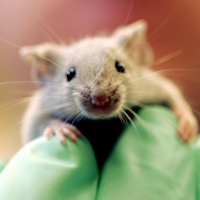30% of Drugs that Work on Animals Don't Work on Humans
 (photo: Robert F. Bukaty, AP)
(photo: Robert F. Bukaty, AP)
The testing of new medical drugs as currently done in the United States is not working, as evidenced by the fact that nearly a third of the time tests on animals prove to be wrong.
Federal researchers say more than 30% of new medications—first tested on mice or other mammals—have failed in human clinical trials because they turn out to be toxic or ineffective.
This discovery has prompted the National Institutes of Health (NIH), with help from the Defense Advanced Research Projects Agency and the Food and Drug Administration, to find a new way to determine the safety of drugs for humans.
That new way will require developing “human tissue chips that accurately model the structure and function of human organs, such as the lung, liver and heart,” according to the NIH. The chips will allow researchers to test drug candidates and better predict safety in human studies “more rapidly and cost-effectively than current methods.”
Using mice to test medications has proven useless when it comes to treatments for sepsis, burns and trauma.
“I was stunned by just how bad the mouse data are,” Dr. Mitchell Fink of UCLA told The New York Times. “It’s really amazing—no correlation at all. These data are so persuasive and so robust that I think funding agencies are going to take note.” Until now, he added, “to get funding, you had to propose experiments using the mouse model.”
-Noel Brinkerhoff
To Learn More:
Tissue Chip for Drug Screening (National Center for Advancing Translational Sciences) (pdf)
Mice Fall Short as Test Subjects for Humans’ Deadly Ills (by Gina Kolata, New York Times)
Of Mice, Men, and Medicine (by Dr. Francis Collins, National Institutes of Health)
Genomic Responses In Mouse Models Poorly Mimic Human Inflammatory Diseases (PNAS)
- Top Stories
- Unusual News
- Where is the Money Going?
- Controversies
- U.S. and the World
- Appointments and Resignations
- Latest News
- Trump Orders ICE and Border Patrol to Kill More Protestors
- Trump Renames National Football League National Trump League
- Trump to Stop Deportations If…
- Trump Denounces World Series
- What If China Invaded the United States?






Comments